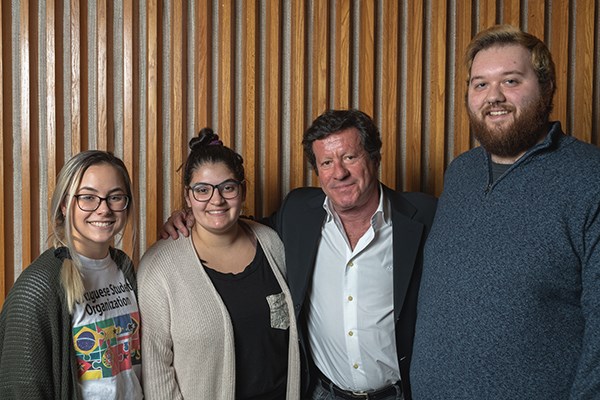Hollywood Star Offers Students a Master Class in Building a Successful Career
 Image by Cameron Blanchard
Image by Cameron Blanchard
12/06/2018
By Katharine Webster
Award-winning Portuguese actor Joaquim de Almeida loves playing the villain, but he’s a little tired of being typecast as a Latin American drug lord.
De Almeida, the first Portuguese actor to make it big in Hollywood, has been in more than 100 movies and TV series, including “Desperado,” “Clear and Present Danger,” “24,” “Queen of the South” and “The Gilded Cage.”
In eight of them, he’s been cast as a drug lord. In fact, he just turned down another such role. He’s also played a priest eight times – but those films are less well-known, he said.
 Image by Cameron Blanchard
Image by Cameron Blanchard
The master class, attended by about 40 students, was led by Assoc. Prof. of Theatre Arts Shelley Barish and Visiting Lecturer in Portuguese Patricia Ferreira. Later in the evening, de Almeida held a similar event for the public with Assoc. Prof. of Digital Media Wael Kamal, at the invitation of the Saab Center for Portuguese Studies, which is celebrating its fifth anniversary.
Students asked all kinds of questions during the master class, and afterwards de Almeida posed for photos with anyone who wanted one. Among the thoughts he shared:
- On acting as a career – “You are unemployed more times than you are employed … If you don’t know how to deal with rejection, you don’t want to be in this business.”
- On how he prepares for each role – “I read the script over and over to get the feel of my character, and then I prepare scene by scene. In each one, I ask myself, ‘Why is he doing this? What reasons make him act this way?’”
- On speaking English with a foreign accent – “I came to the U.S. at a time when they wanted real actors with real accents. Today, I think the tendency is for younger actors to feel they have to take speech lessons to lose the accent if they want to act in big studio films.”
- On playing roles in six different languages – “I’ve played everything but a Portuguese. I’ve played South Americans, Italians, Frenchmen.”
- On the pace of work in television and film – “On film, you have time to work with the character. In television, everything changes every day. The script gets rewritten and you have to learn a whole new scene in a couple of hours. It’s fast and it’s tough.”
- On acting for film – “You have to know the size of the lens shooting you – the tighter the lens, the less you can do. On camera, less is more, but you have to feel the emotion all through you. Emotion in the eyes is important.”
 Image by Cameron Blanchard
De Almeida takes a photo with members of the Portuguese Students Association.
Image by Cameron Blanchard
De Almeida takes a photo with members of the Portuguese Students Association. - On the difference between studio and indie films, besides the budget – “Independent film, you are more part of the film. People listen to you. You feel like you belong. You understand the whole film and you know everybody. On a big studio film, you come and you do your job. It’s a little lonely.”
Theatre Arts major Alexander Wedge, who aspires to be an actor, said he appreciated de Almeida’s reminder that rejection is inevitable and that it’s OK to fail. Wedge also said he was heartened to learn that actors of color are not just considered for roles representing characters of their own race or ethnicity, but that casting calls are now more general.
“Meeting Joaquim was great!” Wedge enthused. “I always appreciate opportunities to meet people who actually have experience in the business.”
De Almeida, 61, has won multiple Portuguese Golden Globes and film festival awards over a career spanning nearly four decades. He told the students he became obsessed with acting after visiting Paris as a teenager and going to a play by the 17th-century playwright Molière.
“After that, I would watch a film and decide each role I was going to play,” he said.
 Image by Tory Wesnofske
Image by Tory Wesnofske
De Almeida began his career on the stage, but landed his first movie role in “The Soldier” in 1982, and never looked back. He went on to more prominent roles in a number of European and South American films, including “Good Morning, Babylon,” which was presented at the Cannes Film Festival.
He returned to Hollywood in 1992 with “Desperado” and now lives in southern California. But he continues to act in films all over the world, sometimes learning his lines phonetically in languages he doesn’t know, including Chinese and Romanian.
 Image by K. Webster
Image by K. Webster
“The toughest part is when you finish a film. The sense of loss is incredible. It’s being with the same people every day for three months, and then you’re home and you don’t see them again for a while,” he said.
“If you’re lucky, you always have another job coming up,” he said. “I’ve been very lucky.”




